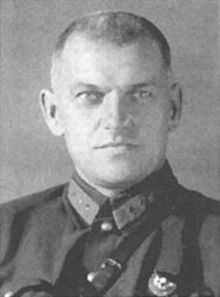Jānis K. Bērziņš

Jānis Bērziņš also Yan Karlovich Berzin (Russian: Ян Карлович Берзин; real name Pēteris Ķuzis; 25 November [O.S. 13 November 1889] 1889–29 July 1938), was a Soviet communist politician.
During World War I, he lived in Sweden under the pseudonym Winter. Bērziņš joined the Bolsheviks after the Russian Revolution, rising to the rank of general and chief of the Latvian Red Army. Following the advent of World War I, he was one of the figures of Imperial Russian Social Democracy most prominent in the revolutionary wing of the anti-war Zimmerwald Conference. A principle organizer of Lenin's Red Terror, Berzin is credited with devising the system of taking and shooting hostages[1] to recover deserters and to put down peasant rebellions in areas controlled by the Red Army. He was recognized by his superiors for his work in pursuing, arresting, and liquidating Russian sailors after the Bolshevik suppression of the Kronstadt rebellion in March 1921.[2] Promoted to head of the Red Army's Fourth Bureau (military intelligence), the GRU, he served from 1920 to 1935.[3] Among his agents was Richard Sorge.[4] A volunteer in the Spanish Civil War under the nom de guerre Grishin, he was an important commander of the Republican forces.
Although a staunch supporter of Joseph Stalin, he was nonetheless arrested on May 13, 1938 during Stalin's purge and was a defendant in the Moscow show trials. On July 29, 1938 he was shot in the cellars of the Lubyanka headquarters on the orders of Stalin.[5]
On 14 December 1948, Alexander Barmine, former chargé d'affaires at the Soviet Embassy in Athens, Greece, advised Federal Bureau of Investigation agents that Berzin informed him prior to Barmine's 1937 defection that Owen Lattimore, head of the U.S. Office of War Information in the Pacific during World War II, was a Soviet agent.[6]
Berzin appears in the Venona decrypts under the code name "Starik" (Russian for "Old man").[7]
References
- ↑ Suvorov, Viktor, Inside Soviet Military Intelligence, New York: Macmillan (1984)
- ↑ Suvorov, Viktor, Inside Soviet Military Intelligence, New York: Macmillan (1984)
- ↑ Suvorov, Viktor, Inside Soviet Military Intelligence, New York: Macmillan (1984)
- ↑ Agent: Sorge, Richard
- ↑ David J. Nordlander, "Origins of a Gulag Capital: Magadan and Stalinist Control in the Early 1930s," Slavic Review, Vol. 57, No. 4 (Winter, 1998), pp. 791-812
- ↑ FBI Report, "Owen Lattimore, Internal Security - R, Espionage - R," September 8, 1949 (FBI File: Owen Lattimore, Part 1A), p. 2 (PDF p. 7)
- ↑ Herbert Romerstein and Eric Breindel, The Venona Secrets: Soviet Espionage and America's Traitors (Washington, DC: Regnery Publishing, 2000), ISBN 0895262754, p. 119